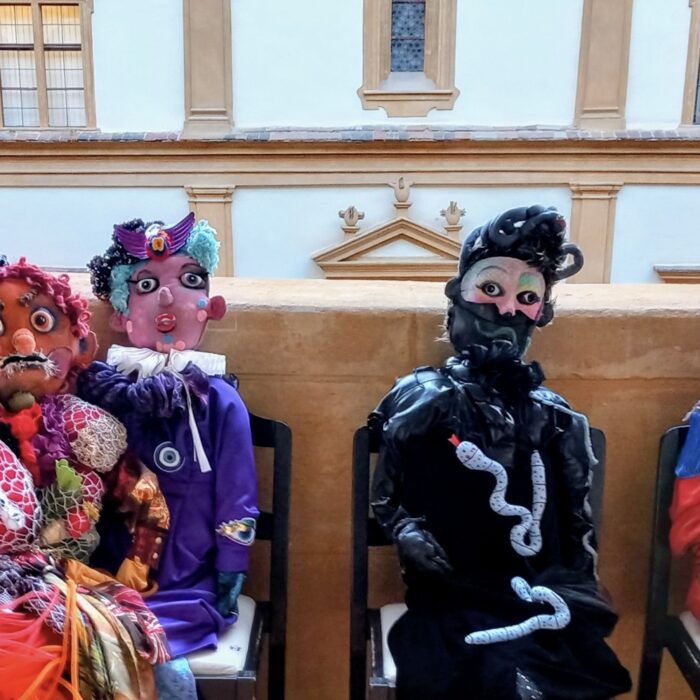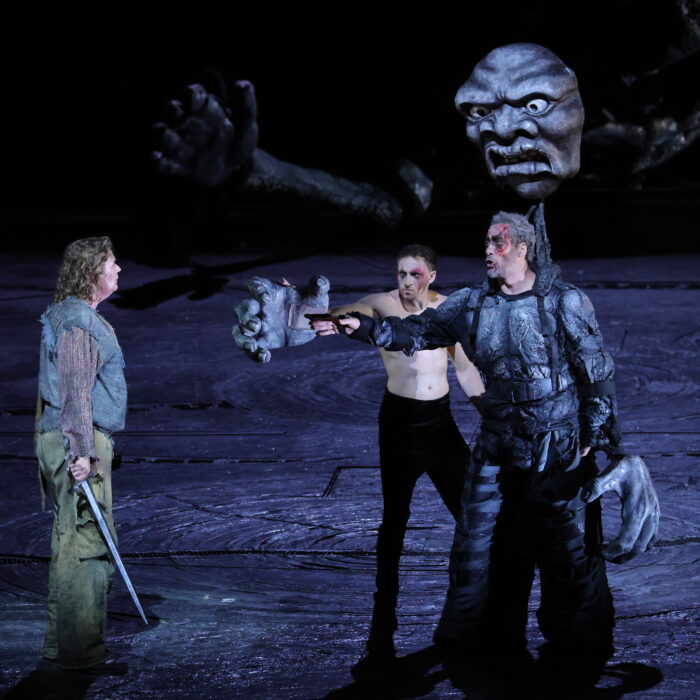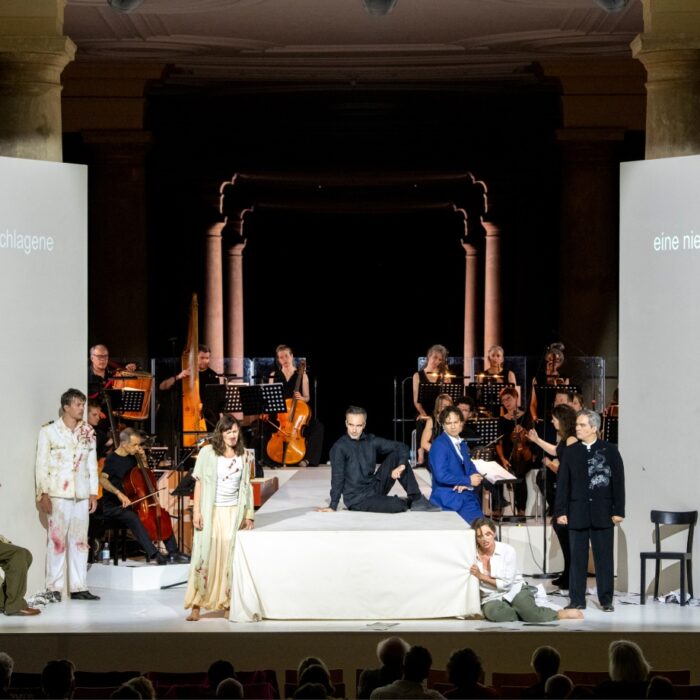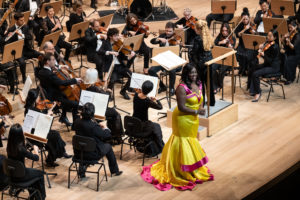
Review: Richard Tucker Gala 2022
A Star-Studded Evening Filled with Thrilling Performances
By Chris RuelPhotos: Dario Acosta
The Richard Tucker Award and Gala came back in full force after two years with no awards. A galaxy of operatic stars was on hand for the event held in the newly renovated David Geffen Hall, which was designed to remedy the venue’s seemingly intractable issue with—of all things—acoustics. (Geffen Hall is the home of the New York Philharmonic.) It was also the designers’ intent for the Hall to be a gathering space where the public can see performances for free streamed from the auditorium on a massive digital display or just hang out with a coffee from the small café in the lobby. Hopefully, some people caught at least part of a magical, musical evening.
If there was such a thing as fantasy opera as there is fantasy football, the artists on the program were the ones everyone wants on their team. What’s next is the written equivalent of a catalog aria of who’s who in the opera world.
We begin with this year’s recipient, soprano Angel Blue. Then there is Stephen Costello (2009 Richard Tucker); Joyce DiDonato (2002 Richard Tucker Award); Michael Fabiano (2014 Richard Tucker Award); Christine Goerke (2001 Richard Tucker Award); Ryan Speedo Green (2011 Sara Tucker Study Grant and 2014 Richard Tucker Career Grant); Renée Fleming (Four-time Grammy Award-winner); Angela Meade (2011 Richard Tucker Award); Reginald Smith, Jr. (2015 Sara Tucker Study Grant and Emmy Award); Eleonora Buratto (Abbiati Prize for Best Singer 2021); Sir Bryn Terfel (Grammy, Classical Brit, Gramophone Awards, and Song Prize Winner 1989 BBC Cardiff Singer of the World); Christian Van Horn (2018 Richard Tucker Award); and the first woman to conduct at La Scala, Maestro Speranza Scappucci.
Missing was Nadine Sierra, who was on the original program and slated to sing “Mi chiamano Mimì” from “La Bohème” and the duet “Va! Je t’ai pardonée” from “Roméo et Juliet” with Costello. Instead, the Italian soprano Eleonora Buratto performed the Act one duet from “Madama Butterfly” with Costello. No reason was given why Sierra was absent.
Joan Tucker, Barry Tucker’s wife, was regrettably absent as well. After a prolonged illness, she unfortunately died. In his opening remarks, her husband dedicated the night to his deceased wife.
The Richard Tucker Foundation is a not-for-profit organization dedicated to honoring one of the greatest tenors of the 20th century. Tucker’s matchless voice opened the evening, filling the new auditorium with his matchless voice before Barry Tucker’s opening remarks. There were lighthearted moments throughout the concert, starting with Tucker announcing two international guests. (The Richard Tucker Foundation supports young opera singers in the United States.) The first guest was “… a Welsh knight who thinks he has won the Richard Tucker Award.” Barry Tucker was, of course, announcing the beloved Sir Bryn Terfel as one of the evening’s performers. Eleonora Burratto, the second international guest, jumped in for Sierra. Burratto is an acclaimed lyric soprano currently performing in the Met Opera production as Elisabetta di Valois in Verdi’s “Don Carlo.” Burratto began her career singing under the legendary maestro Riccardo Muti. In 2021, the soprano won the Abbiati Award for “Best Singer 2021”, which was awarded by the Italian Association of Music Critics.
Let’s talk singing and let’s be honest; these vocalists are at the top of their games. Listening to critique each note and phrase seems at odds with the spirit of the Gala. This was an evening of celebration, a Richard Tucker Award-winner reunion. Performers volunteered their time, which is always in limited supply. Several vocalists—like Burratto or Stephen Costello—are currently singing at the Met, so they did not simply give of their time but of their immense talent, singing on a “night off,” so to speak.
Congratulations, Angel Blue
The evening paid tribute to the legacy of Richard Tucker and the Foundation’s most recent Award recipient, soprano Angel Blue.
Blue kicked off the Gala in stellar form. She entered wearing a jasmine yellow mermaid dress with dark pink trim and was received with enthusiastic clapping and cheering. She had yet to sing a note, but deserved every clap and hoot. Onstage, the Grammy Award and now Richard Tucker Award-winner radiated with joy as bright as her dress.
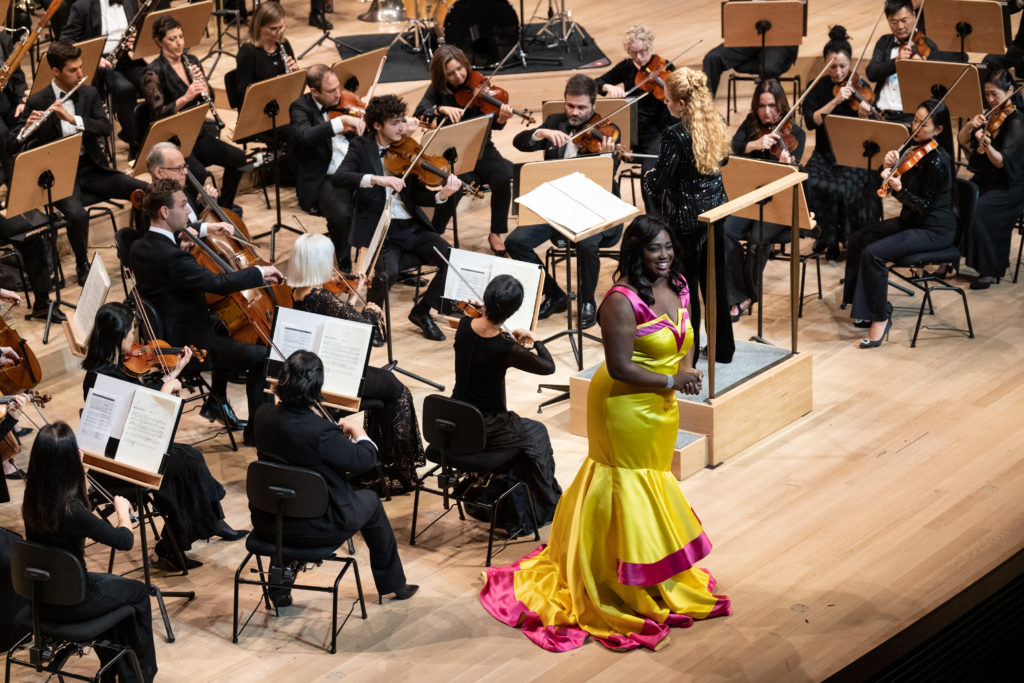
Once the crowd calmed, Blue sang “Vissi d’Arte,” from “Tosca.” This month Blue will perform the title role alongside Michael Fabiano at LA Opera and reprise the role at Santa Fe Opera.
Blue’s emotive power and striking, rich voice, plush as a fine red wine, caused goosebumps to rise and sent a shiver down backs with its loveliness with each phrase. It sounded and appeared effortless. Her voice, in the new, improved auditorium, rode the waves of music put out by the orchestra. When she sang the A flat above the staff, it was crystal clear and powerful in emotion and sound.
Later, Blue returned to the stage, wearing her signature blue dress to sing “Sull’aria” from “Nozze di Figaro,” and was joined by none other than Renée Fleming. Fleming wasn’t so much a surprise guest—they listed her in the program—but her musical selection was kept quiet, and the audience was kept in suspense until the legendary singer made her appearance with Blue. Well over 1,000 opera fans reveled in the matchless voices of two Grammy winners, one of whom is a national treasure and the other a fast-rising star well on her way to the top of the opera world.
Singing Like the Devil
Sandwiched between selections from Puccini and Mozart was Gounod. Michael Fabiano and Christian Van Horn sang the Act one duet from “Faust,” “Mais ce Dieu.” Fabiano and Van Horn aren’t strangers, having sung Boito’s “Mefistofele” together at the Met during the 2018-19 season, with Fabiano as Faust, and Van Horn, in the title role.
The duo had excellent chemistry during the concert, playing characters well-known to each artist. Fabiano came out of the gate full force, projecting well into the seats furthest from the stage. The tenor is a human trumpet with powerful brassiness and an unstoppable sound that could penetrate concrete.
Van Horn drew his sound from deep within, his striking bass-baritone well suited for villainy. The tall, thunder-voiced singer has played several, from the Devil to Don Giovanni to the Four Villains from “Les Contes d’Hoffmann.” But Van Horn also excels as a ‘good guy,’ playing more upstanding characters such as Escamillo, the title role in “Nozze di Figaro,” and Colline in “La Bohème.”
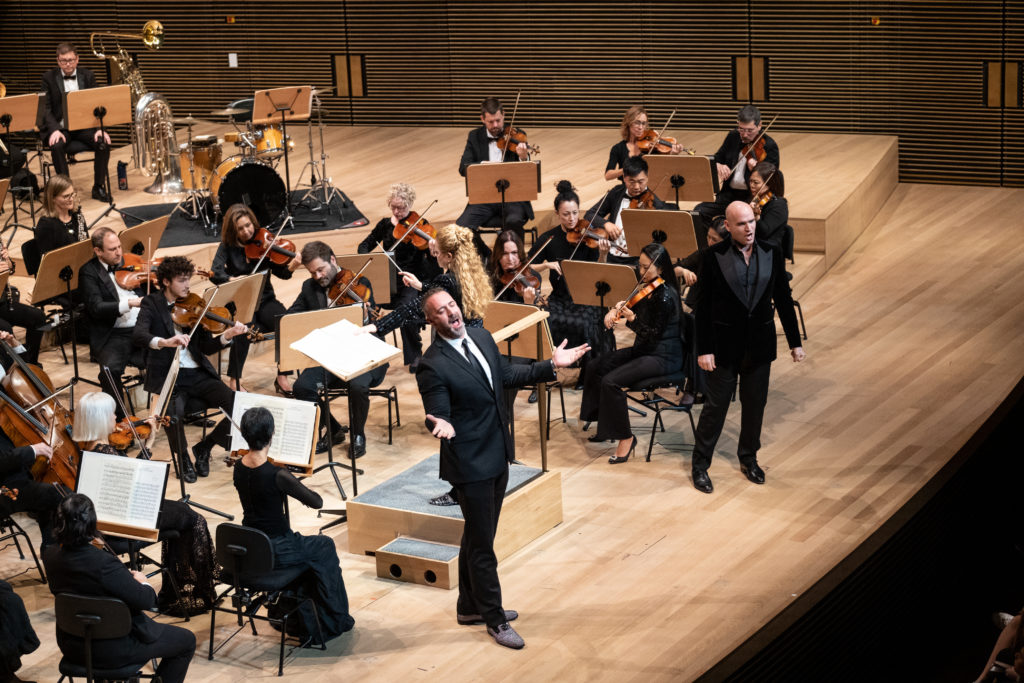
Like Fabiano, Van Horn had two stage appearances, the first mentioned above and the second in the Act two finale from “Aida.”
Fabiano’s evening consisted of the “Faust” duet, and before he took the audience far into the opera catalog with his performance of “Lamento di Federico” from Cilea’s “L’Arlesiana.”
Later in the program, Van Horn soloed “Infelice” from “Ernani.” His stentorian voice, like that of the Commendatore—dominates the darker passages with heavyweight power.
Low Voices, High Marks
Sticking to low voices, bass-baritone Ryan Speedo Green took the audience to Spain with his rendition of “A votre toast” from “Carmen.” Toward the end of the aria, the vain bullfighter gained a few women friends: Renée Fleming, Joyce DiDonato, and Angel Blue, who playfully stuck their heads out of the stage right door to glimpse the braggadocio that enamored them. It was a visual gag as the three A-listers gave Green googly eyes of the amorous kind. It was a good joke that was well-received.
Returning to the tenors, if Fabiano is a delightful wall-buster of a singer, Stephen Costello is a lighter and possesses a razor-sharp voice as light as a crystal feather—clear, bright, and light. Costello is currently singing the role of Alfredo in “Traviata” at the Met. The impression given by Costello was one of restraint rather than going full bore, which is understandable. The tenor had a Met performance the prior evening.
The tenor’s spellbinding sweet lyric voice singing “Quando le sere” from “Luisa Miller” and the Act two duet from “Madama Butterfly,” alongside Eleonora Burratto, was moving.
Burratto had her opportunity to shine as a soloist with “Un bel di,” the gorgeous aria from “Butterfly.” Burratto started off pianissimo, floating notes high above the audience before building to the climax with a slow crescendo to the high G before drifting down into stunning pianissimo once more. Spine-tingling is an apt description.
Ryan Speedo Green joined Angel Blue for the “Crown-Bess” duet from “Porgy and Bess.” It was for “Porgy and Bess” that Blue took home a Grammy in the Best Opera Recording category.
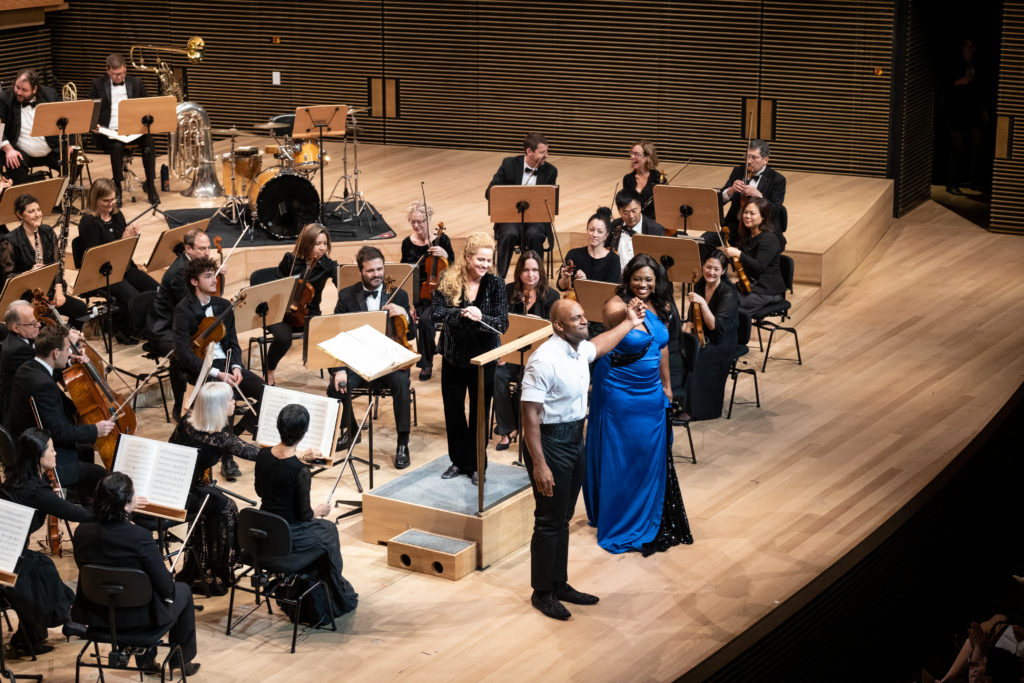
Green has an enormous, Wagnerian/Straussian voice. He’s sung Vaarlam in “Boris Godunov,” Kurwenal in “Tristan und Isolde,” and Oreste in R. Strauss’ “Elektra.”
Like Blue, Green also performed in the Met’s production of “Porgy and Bess” as Jake and will sing the leading role of Emile Griffith in Terrence Blanchard’s “Champion” at the Met later this season.
Blue had no trouble holding her own as she sang powerfully enough to cut through and match Green’s tremendous, earth-shaking vocals in the “Porgy and Bess” duet.
Mad Scenes, More “Mefistofele,” and Sir Bryn Terfel
The amazing Angela Meade burned the house down with her sharp musicianship, putting the mad in the “Roberto Devereux” mad scene. Meade sang “Vivi ingrata…Quel sangue” destroying the crowd with her artistry and very convincing performance of the insanity that descends on Queen Elizabeth I upon the title character’s execution. This was Meade’s one and only appearance. Another number from the soprano would have been heartily welcomed, thus proving true the adage, “Leave them wanting more.”
Tenor Russell Thomas’ selection was “La vita e inferno” from “Forza del Destino.” Thomas’ 2022-23 season includes him singing three Verdi title roles: Ernani at Lyric Opera of Chicago, Don Carlo at the Met, and Otello at LA Opera.
By the time Thomas came on stage, the audience had heard the clarion call of Fabiano and the nuanced lyricism of Costello. Thomas brought a new tone that was authoritative, no-nonsense, and an excellent example of a Verdi tenor—a boulder in the lower register and dynamite spinto up top.
Beloved mezzo-soprano Joyce DiDonato brought some baroque to the party with an aria from Gluck’s “Ezio.” (1750). Her selection from the opera was the aria, “Misera, dove son.”
DiDonato is one of the most exciting expositors of the baroque, which features a solid repertoire for mezzos, high and low, to dig into and shine. DiDonato seems never to cease shining, whether she’s singing baroque or contemporary opera. The mezzo is set to perform in “The Hours” with two other big names, Renée Fleming and Kelli O’Hara.
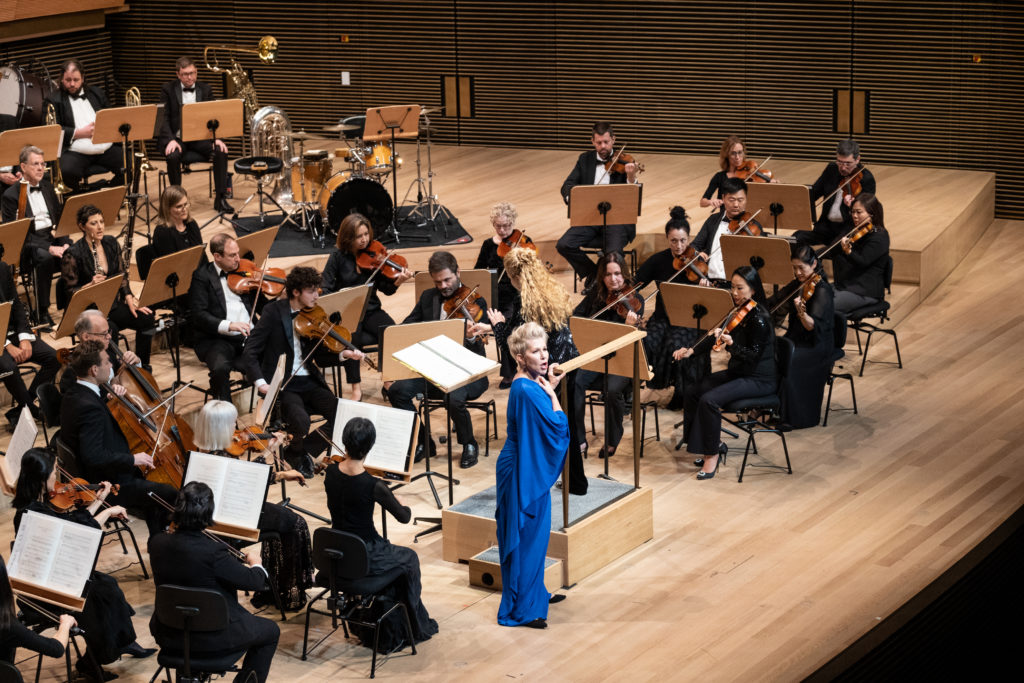
Her Tucker Gala performance was full of lightning-fast runs and melismas, which test a mezzo’s range at both ends. It’s no surprise DiDonato passed this test, as she has for many years, with precision and verve.
Before the stunning Act two finale of “Aida” closed the concert, the Welsh knight Barry Tucker mentioned in his opening remarks made his way to the stage and brought along with him a good deal of fun.
Terfel summoned Old Scratch from Boito’s “Mefistofele,” and we were back in Faustian territory.
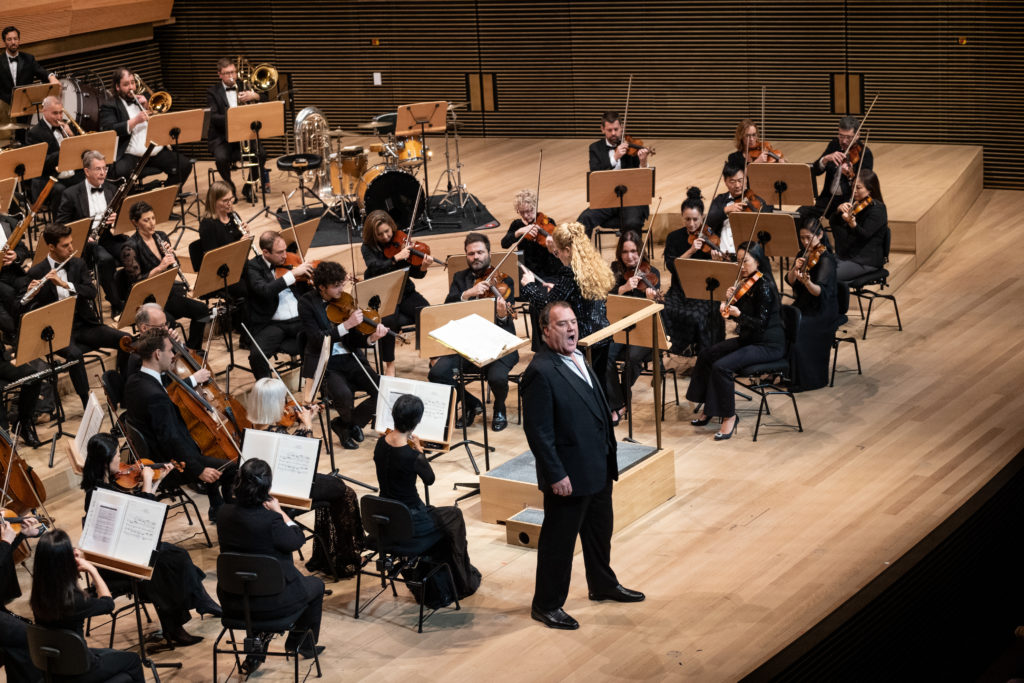
Terfel’s selection was Mefistofele’s aria, “Son lo Spirito,” A.K.A., the Whistle Aria. If you think Terfel can sing, wait until you hear him whistle; he could break glass. Terfel hammed it up with his colorful, long-drawn-out “Nahs,” which sent ripples of laughter across the auditorium.
Terfel remained onstage after “Son lo Spirito” to do little Broadway. After tossing his sport coat to the floor, he sings “If I were a rich man” from “Fiddler on the Roof.” The audience loved it, joining in the fun by clapping to the beat, and Terfel did too. The great bass-baritone had kept his repertoire secret, as with Fleming and DiDonato, and those in the seats liked the big reveals when each took the stage. Slipping in some Broadway is a good way to break down artificial barriers between high and popular entertainment. Opera is musical theater. Musicals are musical theater. Both are different, yet at the core, they are much the same.
Grand Opera for a Grand Event
The end of the evening brought spectacle. While no horses or mules or other sundry animals crossed the new Geffen stage as they do a stone’s throw away at the Met, the “Aida” Act two finale was no less awe-inspiring, if only for the magnitude of the stars performing. Angel Blue, Christine Goerke, Russell Thomas, Reggie Smith, Christian Van Horn, and Ryan Speedo Green were all on stage.
Met Orchestra trumpeters had snuck their way to the very top boxes, and as if to prove the $550 million upgrade delivered on its acoustic promise, the audience was treated to stereo brass—three trumpeters on both the right and left sides. Apart from kicking the auditorium’s tires, having the trumpets sounding from far above the audience was pretty damn cool and added a lot of pomp to the operatic circumstance. As for the acoustics? Monumentally better than what had existed before.
Conductor Speranza Scappucci was impressive, and unlike the soloists, she, along with the orchestra, didn’t get a break, but Scappucci never flagged; if anything, she grew more animated as the evening progressed.
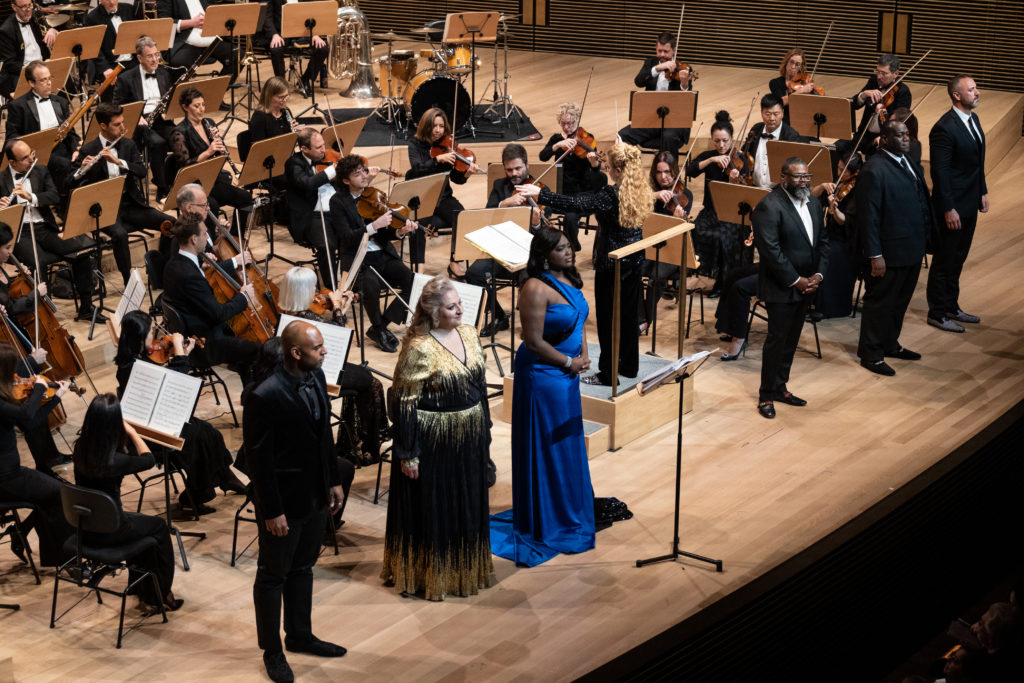
While Scappucci used a range of dynamics, perhaps the new auditorium’s acoustics are too good. The band sounded great, but overpowered at times. If you can’t hear Michael Fabiano, then Houston, we have a problem. The issue wasn’t constant, though it was still disappointing. You want to hear every note from whoever is singing.
Scappucci’s style was interesting. Her movements were geometric, with the greatest amount of flair reserved for big slashes of the baton to close out pieces. The best way to describe her time on the podium is intriguing. For conductor watchers, her direction was cryptic. Nevertheless, the soloists, the Orchestra, and the Chorus knew how to respond, and true to form, they all put on a great show.

